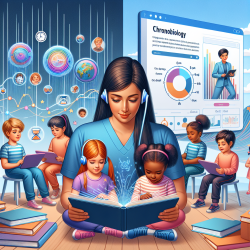Introduction
In the ever-evolving field of speech-language pathology, understanding the intricacies of brain function can significantly enhance therapeutic outcomes. The recent research on "Paradoxical Facilitation alongside Interhemispheric Inhibition" offers groundbreaking insights that can be leveraged to improve speech therapy practices. This blog delves into the findings of this research and explores how practitioners can apply these insights to enhance therapy outcomes for children.
Understanding Paradoxical Facilitation
The study conducted by Belyk et al. (2021) investigates the neurophysiological mechanisms underlying interhemispheric inhibition (IHI) using transcranial magnetic stimulation (TMS). Traditionally, IHI is understood as a process where a conditioning stimulus (CS) applied to one hemisphere inhibits the motor evoked potentials (MEPs) in the opposite hemisphere. However, this research reveals a paradoxical facilitation effect, where larger CS MEPs are associated with reduced inhibition, sometimes leading to net facilitation.
Implications for Speech Therapy
For speech-language pathologists, these findings open new avenues for therapeutic interventions. Here’s how:
- Customized Therapy Plans: Understanding the facilitation effects can help tailor therapy sessions to individual neural responses, potentially accelerating progress in children with speech disorders.
- Enhanced Neuroplasticity: By leveraging paradoxical facilitation, therapists can potentially enhance neuroplasticity, aiding in the recovery of speech functions, especially in cases of unilateral brain damage.
- Data-Driven Decisions: The research underscores the importance of data in therapy. Practitioners can use similar neurophysiological measures to track progress and adjust interventions accordingly.
Encouraging Further Research
While the study provides valuable insights, it also highlights the need for further research to fully understand the mechanisms of paradoxical facilitation. Speech-language pathologists are encouraged to explore these findings in their practice and contribute to the growing body of research. Potential areas for further exploration include:
- Investigating the role of different brain regions in speech facilitation.
- Exploring the effects of varying CS intensities on speech outcomes.
- Studying the long-term impacts of therapy adjustments based on facilitation effects.
Conclusion
The findings from the study on paradoxical facilitation and interhemispheric inhibition provide a promising avenue for enhancing speech therapy outcomes. By integrating these insights into practice, speech-language pathologists can make informed, data-driven decisions that could significantly improve the quality of life for children with speech disorders. As we continue to unravel the complexities of the brain, the potential for innovative therapeutic approaches grows, offering hope and improved outcomes for many.
To read the original research paper, please follow this link: Paradoxical facilitation alongside interhemispheric inhibition.










